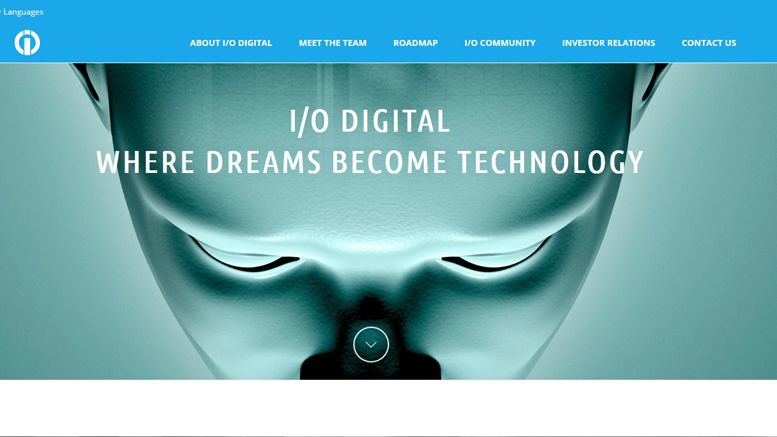
I/O Digital to Release World’s First Decentralized Identity SideChain For Bitcoin
I/O Digital sets to release the first ever decentralized identity sidechain using a distributed blockchain based DNS system. This system, known as DIONS (Decentralized I/O Name Server) will utilize the I/O Digital blockchain to attach sensitive identity credentials to a specific Bitcoin (XBT) or I/O Coin (IOC) address.
The system allows for the registration of aliases, avatars, documents, making them fully transferable between users. DIONS will offer strong security by integrating a fully fledged RSA cryptosystem (using a 2048 bits long key).
DIONS will support a decentralized messaging system. The system will enable fast, easy and secure communication between users. Not only will users be able to send encrypted private messages, they will also have the option to broadcast messages to the wider world via a decentralized Twitter-esque micro-blogging service. This service could also be used as a “reddit” like service, that could revolutionize the centralized service, into the first one of a kind decentralized blogging service.
Businesses, as well as being able to make use of their own brand names, can now use unique IDs to serve as a customer, invoice, or reference numbers (e.g. HSBC:8008135). This provides a more familiar format for customers more accustomed to the naming conventions of email. It also allows businesses to benefit from vastly reduced fees and the robustness and easy auditability of a decentralized distributed database.
I/O Digital’s Blockchain also aims at servicing holders of intellectual property, rights management, certificates of authenticity and condition reports. A hash value included in an I/O transaction can serve as Proof of Existence for any digital file, be it a legal document, an application’s source code, artwork or a piece of music. The timestamp of the block that the hash value is included in, becomes a timestamp of the file itself, creating immutable proof that it existed in that form at that particular moment in time.
I/O Digital is also departing from the normal Bitcoin QT wallet. The team has developed the first full HTML5 cryptocurrency wallet in the world, that doesn’t use the classic Bitcoin-QT wallet. Allowing for a more user friendly front end and a more versatile wallet system.
How will I/O Digital deal with data bloat?
To alleviate data bloat and to enable bitcoin users the ability to use DIONS, I/O Digital introduced a Project Codename “I/O Chameleon”. Developed over a twelve-month period, I/O Chameleon is a framework which will allow for the creation of any number of unique and interoperable I/O Digital sidechains. These auxiliary blockchains will each have unique properties suited to the particular set of services and applications that they will support. This network of blockchains, or “superchain”, will afford unparalleled flexibility to I/O users, allowing any of a number of configurations and features to be seamlessly adopted depending on the use case.
The framework itself will collate data from the various chains and allow the application of generic control policies via an extensive high level API. For end users this means access to the full range of I/O Digital functions, applications and services from a single interface – a web front end from which to easily manage an array of advanced decentralized applications.
Though the blockchains comprising the Chameleon network will initially be limited to I/O Sidechains, they will incorporate a 2-way Peg to the Bitcoin Blockchain, that will allow Bitcoin users the ability to use the DIONS system. In the near future, it will be technically possible to include other projects, should another project develop an especially secure, useful feature or application, the development team with consensus from the community, may choose to integrate it into Chameleon so that I/O Coin and Bitcoin users may also benefit from it.
I/O Coin was founded in July 2014 by Joel Bosch, the CEO of an Apple IT Services company, with over 10 years experience in Management IT Services. with an idea and vision to create a legitimate cryptocurrency focusing on user friendly applications. As the blockchain project progressed, I/O Digital was branded as the umbrella for various applications and their focus is to provide advanced blockchain services to individuals and companies interested in the economic and security benefits offered. I/O Digital’s core development team is fully transparent. The team is led by Joel Bosh, Lead Developer Derek Hatton, POS Security & Systems Management Sam Gabsi, HTML5 Wallet Developer Pat Smuk and Community & Investor Relations Richard Groen.
I/O Digital is not just a cryptocurrency, but an entire blockchain based decentralized application development project, built out on I/O Coin’s blockchain. Anyone is welcome to use the I/O Digital blockchain for their own services, and interested parties can contact Richard Groen, the I/O Digital community and investor relations manager at [email protected]
To learn more about I/O Digital please go to: http://www.iodigital.io/
To trade I/O Coin (IOC) with Bitcoin please go to:
https://bittrex.com/Market/Index?MarketName=BTC-IOC
Visit I/O Coin on bitcointalk: https://bitcointalk.org/index.php?topic=695855.0
View the I/O Coin roadmap infographic at: http://iocoin.io/upload/ioc_infographic_final_release.jpg
Related News





